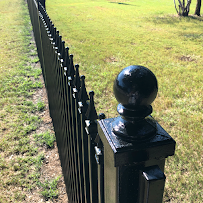A custom gate is more than just a boundary marker for your property—it’s a statement of style, security, and functionality. Whether you’re looking to enhance the curb appeal of your home, increase privacy, or improve security, a custom gate can make a significant difference. However, one of the most common questions homeowners have is: how much does it cost to build a custom gate? The answer depends on several factors, including materials, size, design complexity, and installation. In this guide, we’ll break down these factors and give you an idea of the investment involved in a custom gate project.
1. Factors That Affect the Cost of a Custom Gate
a. Material Choice
The type of material you choose for your gate has a major impact on the cost. Common materials include:
- Wood: Wood gates provide a classic and natural look. They are relatively affordable, with prices ranging from $1,000 to $4,000 for a standard-sized gate. Premium hardwoods like mahogany or teak can cost more due to their durability and rich appearance. Wooden gates may require regular maintenance, such as staining or sealing, to protect against weather damage.
- Wrought Iron: Wrought iron gates are known for elegance and strength. They are more expensive, ranging from $2,000 to $8,000 or more depending on the design complexity. Intricate patterns and ornate details increase the cost significantly.
- Aluminum: Aluminum gates are lightweight, resistant to rust, and low maintenance. They are often more affordable than wrought iron, typically costing between $2,000 and $5,000.
- Steel: Steel gates are highly durable and secure, with prices ranging from $3,000 to $7,000. Powder-coated finishes can help prevent rust and extend the lifespan.
- Composite or Vinyl: These materials are low-maintenance and can mimic wood or metal designs. Costs generally range from $1,500 to $4,000.
b. Size and Dimensions
The size of your gate is another major factor. A standard single gate (about 10–12 feet wide) will cost less than a large double or sliding gate. Taller and wider gates require more material and stronger support structures, which increase costs. For example:
- Single gates: $1,000–$4,000
- Double gates: $2,500–$10,000
- Sliding or automated gates: $3,000–$12,000
c. Design Complexity
Custom gates can range from simple, minimalist designs to intricate patterns with decorative elements. The more complex the design, the higher the cost due to additional labor and craftsmanship required. For example:
- Simple gates: Basic panel designs with straight lines are the most affordable.
- Ornate gates: Features like scrollwork, decorative finials, and intricate carvings can double or even triple the cost.
d. Automation and Technology
Adding automation to your gate—such as remote control access, sensors, or smart home integration—can significantly increase costs. Automated gates typically require electric motors, control panels, and professional installation. Expect to add $1,500–$5,000 to your total cost for automation, depending on the complexity of the system.
e. Installation Costs
Installation is often overlooked but plays a crucial role in the overall cost. Factors influencing installation include:
- Ground preparation (leveling, driveway reinforcement)
- Hinges, tracks, and hardware
- Labor charges (which vary by region)
Installation costs can range from $500 to $3,000, depending on the gate’s size, material, and whether it is automated.
2. Additional Costs to Consider
- Permits: Some municipalities require building permits for gates, especially automated or oversized ones. Permit fees typically range from $50 to $500.
- Maintenance: Gates, especially wooden and wrought iron ones, may require periodic maintenance to prevent damage and preserve aesthetics.
- Security Features: Extra features like intercom systems, cameras, or keypads can add $500–$2,000 to your total cost.
3. Cost Examples
Here are some rough estimates to give you a better idea:
| Gate Type | Material | Size | Estimated Cost |
|---|---|---|---|
| Single Entry | Wood | 10 ft | $1,200–$2,500 |
| Double Entry | Wrought Iron | 16 ft | $5,000–$12,000 |
| Sliding Gate | Aluminum | 12 ft | $3,000–$6,000 |
| Custom Design | Steel | 14 ft | $7,000–$15,000 |
| Automated Gate | Wrought Iron | 16 ft | $8,000–$18,000 |
These costs can vary based on location, contractor rates, and material availability, but they provide a useful benchmark.
4. Tips for Managing Costs
- Set a budget: Decide what you are willing to spend before starting the project.
- Choose materials wisely: Consider maintenance costs alongside initial investment.
- Get multiple quotes: Compare different contractors to find the best balance between price and quality.
- Prioritize features: Focus on must-have features first; optional decorative elements can be added later.
5. Conclusion:
Building a custom gate is an investment that enhances your property’s appearance, security, and value. Costs vary widely depending on material, size, design, and additional features like automation. A basic wooden gate may start at around $1,000, while a fully automated wrought iron gate can exceed $15,000. By understanding the factors affecting cost and planning carefully, you can create a beautiful and functional gate that fits your budget and enhances your home’s curb appeal.
Investing in a custom gate is about more than just spending money—it’s about creating a lasting impression and providing safety and privacy for years to come. With careful planning, you can achieve the perfect balance of design, durability, and cost.

